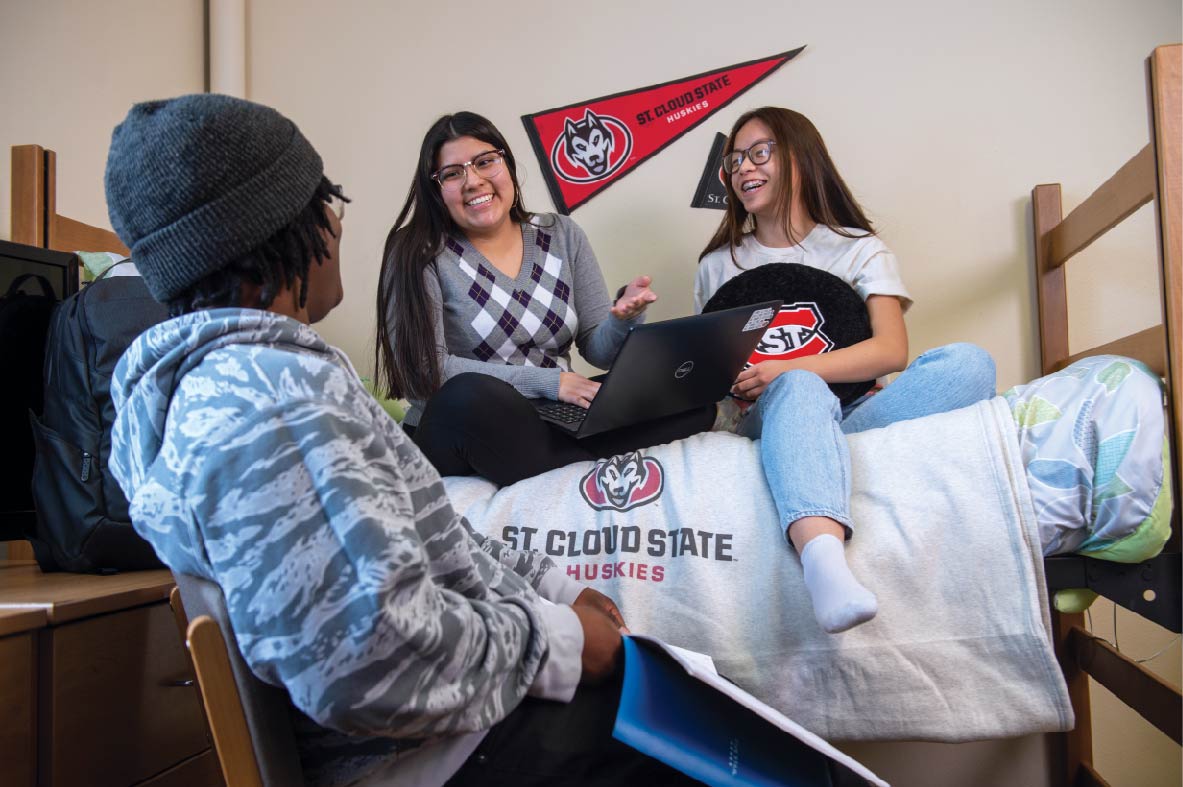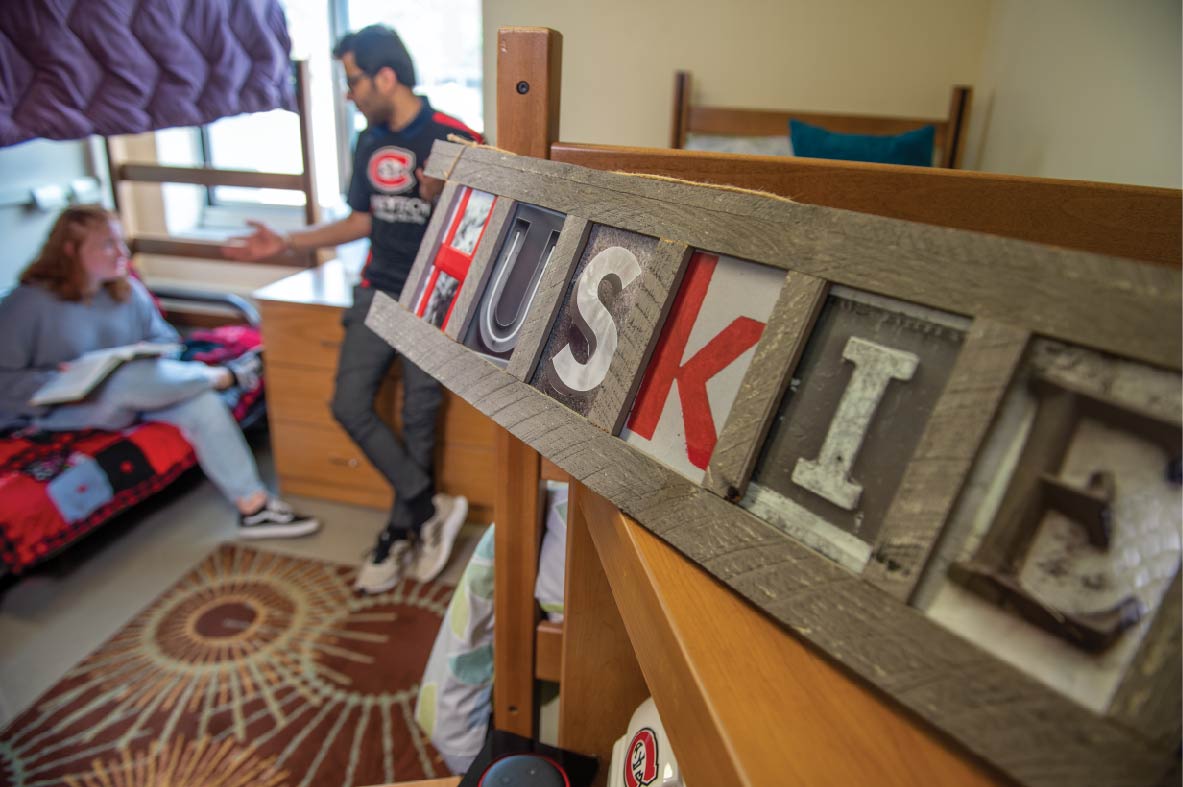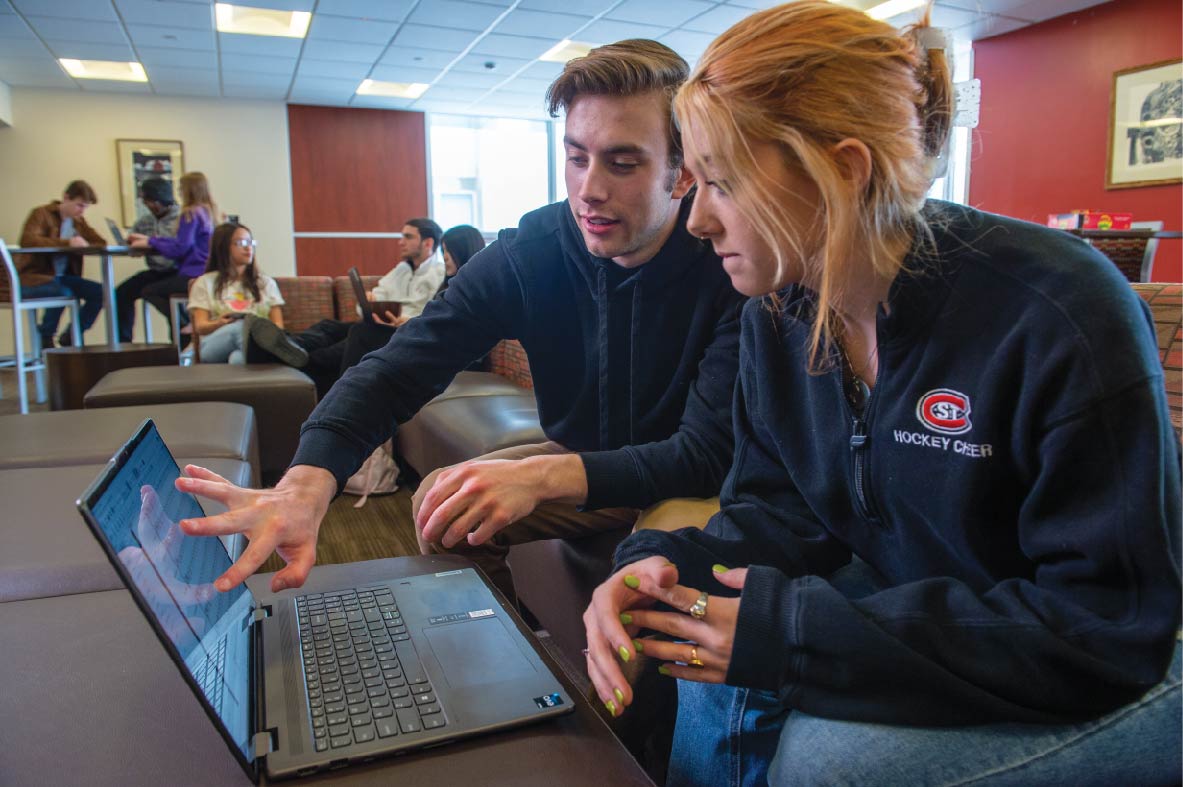
While some aspects of campus residence hall living have changed dramatically through the years, starting college life in a place filled with new friends and supportive staff always has offered priceless benefits for students at SCSU.
“There’s a prevailing desire among students to live on campus, to have that one-one-one connection,” said Patrick Call, executive director of Residential Life at SCSU. “They learn how to interact with people through community involvement and gain a sense of security. They flourish when they come in and make friends.
“The goal is to give them that foothold, to feel safe and secure but also to live into their true selves.
Fall of 2023 across-the-board enrollment increases at SCSU include a 14 percent jump in its on-campus population over fall 2022, to a total of 1,037 living in campus residence halls and enjoying the benefits of campus living.
When junior criminal justice major Taylor Gaston started college, it was during COVID and, like many others, she lived at home in Coon Rapids. When she transitioned to campus living her sophomore year, everything was new to her.
“I didn’t know anybody, but the campus was extremely welcoming,” said Gaston, who had weathered a difficult year that included an abusive relationship. She reached out and found the on-campus support she needed to move forward from sources including her residence hall community advisor, Counseling Services, Title IX Office and the Women’s Center. “Everybody made me feel safe.”
“I think it’s amazing to have a roommate, to get different perspectives, figure out how to resolve differences,” Gaston said. “It can be a fun thing and a frustrating thing. It’s kind of awesome.”

Now a junior with campus jobs as desk advisor in Stearns Hall and office worker for Public Safety, Gaston has the experience and empathy to help other students ease into campus life. “In my desk assistant job, I greet students with a smile and hope they open up to me,” she said.
Erin McClure, who has lived or worked around SCSU residence halls for 22 years, also has gone from the receiving end of benefits from living in a residence hall to helping give students the same fantastic experience she had her freshman year in Case-Hill Hall.
“Because of my experience meeting so many people and getting involved on campus that first year, I applied to be a CA (community advisor),” she said. “I wanted to encourage other students to engage in activities on campus, like the staff in my residence hall did for me.”
She was a CA for four years, graduating in 2007. She married Dan McClure, currently a sergeant with the St. Cloud Police Department, who at the time was hall director for W.W. Holes Hall.
Their first home together was the Holes Hall director apartment. Erin joined the Department of Residential Life staff and currently is room assignments coordinator.
Through ups and downs of enrollment numbers and the impact of COVID, student housing has made big steps, Call said, including most recently improving security in bathrooms, having single-occupancy rooms available and free laundry.
“COVID took the wind out of everyone’s sails, on campuses everywhere,” Call said. “SCSU responded with giving students what they wanted with more amenities at the right price point.
“Coming into this year we reduced the cost of housing rate by 15 percent. Now we have the most affordable campus housing among MinnState universities.”
The University is attracting students to on-campus living with new opportunities, including an overnight program that invites incoming students to spend a night in a residence hall as part of their advising and registration days during the summer before freshman year. “From the feedback, this program has been very well received,” Call said. “We’re also engaging in better marketing and have upgraded our website with a 3D view of our residential rooms.”
“A residence hall is more than just a place to sleep. It’s a place for students to put down their books and enjoy their new home surrounded by friends and activities.” — Erin McClure
Just as residence hall living has evolved over the years, so have the challenges for helping new students adjust, said Call.
“Many students aren’t used to the level of sharing on-campus living entails. We’ve found that the majority had their own rooms; half had their own bathrooms,” he said. “Hearing someone else breathe in the same room is a new experience.”
Early 20th century roommates in Lawrence Hall for women shared a double bed and a study table. Up through the 1950s, residents of “Larry” and Shoemaker halls were required to wear dresses and stand for prayers at meals served in basement dining halls. Their phone conversations were carried out on the single phone serving the entire “dorm”, and curfews for freshmen were strictly enforced by housemothers. Restrictions reflected the mores and practices of the times.
“For today’s students, life in general is different,” McClure said. “The development of technology has changed how we do things on campus. When I was a freshman, I bought a laptop and a printer for in my room but didn’t use it as much as students do now. I would go to the library and use the computers there.”

McClure recalls there was more interaction among residents in earlier times, before cell phones and video games occupied much of their time.
“Everyone on our floors had the doors open and we would go from room to room visiting with floormates, working on homework, watching what the popular show was at the time,” she said. “I see students now able to do almost everything they need to do from within their room, with their door shut. I’m sure COVID had a lot to do with that. Besides the pressures of academic life, students are facing the new experience of sharing personal space.”
The hundreds of international students who come to campus each year have even greater adjustments to overcome as they get comfortable in a new country and interacting with people from other cultures.
“I have one student from Japan who is rooming with a student from Minnesota,” said Simi Lifwatila, a community advisor in Shoemaker Hall who came to St. Cloud State from Zambia last year with his twin brother Kalumba, also a residence hall community advisor. “They’re getting to know each other” he said. “It takes a while to get used to having a roommate.”
Lifwatila said “being there for them” is an important part of his role.
“We sit down and talk about their issues or problems and try to help them find common ground,” he said.
“Now we have the most affordable campus housing among MinnState universities.” — Patrick Call
Mitchell Hall community advisor Grant Kiley moved into Case Hall from his hometown of Holdingford his freshman year.
“I was really excited about the fact that I got to meet new people and had a campus to explore,” he said. “I learned having good social network of people, having that community, is important.”
“I like being a community advisor a lot,” added Kiley, who is a music education major. “It’s a really good opportunity to get to help build a hall community. I think living on campus is good way for everyone to start.”
“We do everything we can in Residential Life to have students engaged with constant activities going on,” McClure said. “A residence hall is more than just a place to sleep. It’s a place for students to put down their books and enjoy their new home surrounded by friends and activities.”
